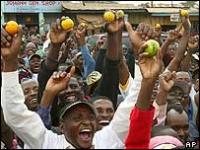







|
News and Information
Kenyan leader accepts poll defeat
| November 22, 2005 |
 People holding oranges at a "No" rally People holding oranges at a "No" rally
To help illiterate voters, the "No" team used oranges and bananas meant "Yes"
Kenya's President Mwai Kibaki has conceded defeat in a crucial vote on a new constitution.
"My government will respect the will of the people," he said, looking sombre, in a live television address.
The BBC's Adam Mynott says the result is a huge setback for Mr Kibaki who led the "Yes" campaign. Many used the poll to protest at Mr Kibaki's leadership.
Crowds of people have been celebrating the result on the streets of the capital, Nairobi.
"No, no, no," they shouted, some wearing orange - the colour of the "No" campaign.
"We were voting to show our frustrations, we were rebelling against the government's empty promises," one of the crowd, Yonah Opiyo, 23, told Reuters news agency.
PARTIAL RESULTS
No: 3,548,477 (57%)
Yes: 2,532,918 (43%)
Turnout: 54%
206/210 constituencies declared
Source: ECK
Tough questions for Kibaki
Have Your Say
"I would like to congratulate all of you for participating peacefully in this historic occasion," Mr Kibaki said. "This is a big step in the democracy of our nation."
Prominent "No" campaigner, Roads Minister Raila Odinga, said: "These are historic days for our country."
Opposition leader Uhuru Kenyatta praised Kenyans for rejecting "the monster of legalized dictatorship".
With just four out of 210 constituencies still to return their results, the "No" campaign has an unassailable lead of almost 1m votes.
The latest figures released by the Electoral Commission of Kenya (ECK) show 3,548,477 (57%) voted "No" while 2,532,918 (43%) backed the draft.
ECK chairman Samuel Kivuitu confirmed that the constitution had been rejected.
Cabinet split
Mr Kibaki's cabinet was split over the constitution, with seven ministers joining with the opposition, urging voters to reject the draft.
DRAFT CONSTITUTION
Prime minister - works to the president
Bans foreign land ownership
Land commission formed - individuals can no longer distribute land
Christian and other religious courts set up; Muslim courts already exist
Regional parties banned
Elections for local officials
Same-sex marriages banned
Women get equal rights to inherit property
Abortion outlawed - unless permitted by parliament
Vote in pictures
Correspondents say a cabinet reshuffle is likely and manoeuvring will increase ahead of general elections due in 2007.
The key issue in the constitution was the introduction of the post of a prime minister.
The president had argued that the constitution - the first since Kenya's independence in 1963 - would be a modernising measure.
But opponents accused him of breaking promises to devolve some of his powers to a new post of prime minister. They argued this would reduce corruption by ending the era of rule by "Big men".
The government has been criticised by donors, who say corruption has continued despite Mr Kibaki's promises to stamp it out.
Colourful campaign
The BBC's Adam Mynott says the returns have shown Kenyans voting according to tribal affiliations - evidence of how the referendum campaign has split the nation along ethnic lines.
The Central Province, home to many of Mr Kibaki's Kikuyu community, was the only one to back the draft - by 92%.
Areas inhabited by Mr Odinga's Luo and the Kalenjin of ex-President Daniel arap Moi overwhelmingly voted "No".
The "Yes" team used the banana symbol, while an orange represented the "No" campaign.
The fruits were chosen by Kenya's electoral commission as non-party political symbols and to aid illiterate voters.
The new constitution would have introduced the post of a prime minister and provide greater rights for women, devolution and land reform.
|
Source: www.bbc.com |
| http://news.bbc.co.uk/2/hi/africa/4459824.stm |
|
| Support Caprivi Freedom |
Fill out the form below to become a member of this site and receive our regular newsletter.
|

|

